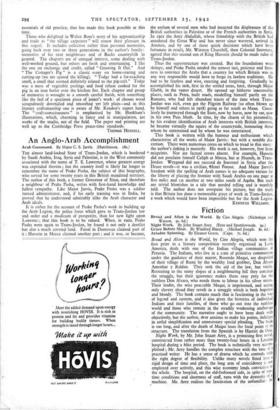An Anglo-Arab Accomplishment
Arab Command. By Major C. S. Jarvis. (Hutchinson. 18s.) THE almost land-locked State of Trans-Jordan, which is bordered by Saudi Arabia, Iraq, Syria and Palestine, is in the West commonly associated with the name of T. E. Lawrence, whose greatest energy was expended therein ; but the country itself is likely far longer to remember the name of Peake Pasha, the subject of this biography, who served for some • twenty years in this British mandated territory. The author of this book, a former Governor of Sinai, and therefore a neighbour of Peake Pasha, writes with first-hand knowledge and fullest sympathy. Like Major Jarvis, Peake Pasha was a soldier turned administrator, and, if his early training was in India, he proved that he understood admirably alike the Arab character and Arab ideals.
It is rather for the account of Peake Pasha's work in building up the Arab Legion, the police force which gave to Trans-Jordan law and order and a modicum of prosperity, than for new light upon Lawrence., that this book is to be valued. When, in 1920, Peake Pasha went again to Trans-Jordan, he found it not only a derelict but also a much coveted land. Faisal in Damascus claimed part of it ; Hussein in Mecca claimed another part ; and it was, or became, the asylum of several men who had incurred the displeasure of the British authorities in Palestine or of the French authorities in Syria. In 1921 the Amir Abdullah, whose friendship with the British had antedated the Great War and has never since wavered, arrived in Amman, and by one of those quick decisions which have been fortunate in result, Mr. Winston Churchill, then Colonial Secretary, agreed that this second son of King Hussein should be made ruler of Trans-Jordan.
Thus the superstructure was created. But the foundations were skimpy, and Peake Pasha needed the utmost tact, patience and firm- ness to convince the Arabs that a country for which Britain was in any way responsible would have to forgo its lawless traditions. He had to be fearless and wise, exacting and forgiving. Gradually he accomplished his task, first in the settled areas, later, through Major Glubb, in the vaster desert. He opened up hitherto inaccessible places, such as Petra, built roads, modelling himself partly on the Romans, who had left -abundant traces of the time when Trans- Jordan was rich, even got the Pilgrim Railway (so often blown up by himself and others in 1918) going as far south as Maan. Cease- lessly he journeyed through the State, now by horse, now by car, now in his own Puss Moth. In time, by the charm of his personality, by his evident identification of Arab interests with British interests, he became virtually the squire of the countryside, honouring those whom he entertained and by whom he was entertained.
This book is written with the humour and enthusiasm which characterise all the works of Major Jarvis : but with a notable dis- cretion. There were numerous corns on which to tread in this story: the author's linking is masterly. His work is not, however, free from misprints. Nor are factual errors absent. For example, Hussein did not proclaim himself Caliph at Mecca, but at Shuneh, in Trans- Jordan. Weygand did not succeed de Jouvenel in Syria after the Druse revolt—it was a civilian, 'Henri Ponsot. And Major Jarvis's freedom with the spelling of Arab names is no adequate excuse for the liberty of placing the frontier with Saudi Arabia on one page at five miles and cn another at two miles south of Aqaba. But such are trivial blemishes in a tale that needed telling and is worthily told. The author does not overpaint his picture, but the truth is that Britain has done a memorable piece of work in Trans-Jordan, a work which would have been impossible but for the Arab Legion.
KENNETH WILLIAMS.


























 Previous page
Previous page